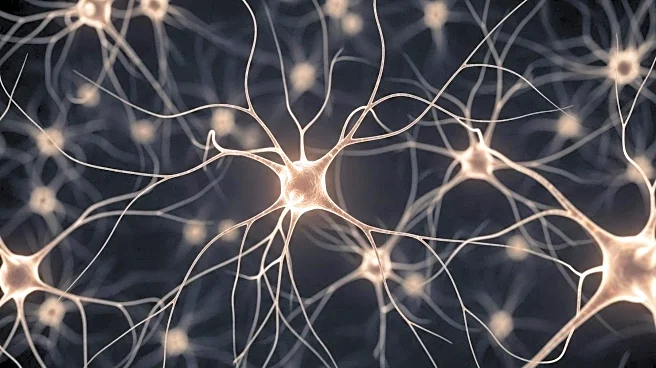What's Happening?
A recent study published in Nature investigates the self-organization of spatio-temporal spike pattern detection in neurons. The research focuses on a one-layer network consisting of pre-synaptic input neurons and post-synaptic output neurons, utilizing biological synaptic mechanisms such as Hebbian learning, heterosynaptic plasticity, and synaptic scaling. The study aims to understand how neurons can self-organize to detect specific spike patterns through synaptic competition and plasticity. The findings suggest that synaptic efficacy can be modified through pre- and post-synaptic components, allowing neurons to learn and memorize patterns based on the timing of spikes. This research contributes to the understanding of neuronal activity and the mechanisms underlying learning and memory.
Why It's Important?
The study's findings have significant implications for neuroscience, particularly in understanding how the brain processes information and learns new patterns. By exploring the mechanisms of synaptic plasticity and competition, the research provides insights into how neurons adapt and organize themselves to detect specific patterns. This knowledge could lead to advancements in developing treatments for neurological disorders and improving artificial intelligence systems that mimic brain functions. The ability to model and predict neuronal behavior could enhance the design of neural networks and improve machine learning algorithms, impacting various industries reliant on AI technology.
What's Next?
Future research may focus on applying these findings to more complex neural networks and exploring the potential for therapeutic applications in treating neurological conditions. Researchers might investigate how these mechanisms can be leveraged to enhance cognitive functions or develop new technologies that replicate brain-like processing. Additionally, there could be further studies on the integration of these principles into artificial intelligence systems, aiming to improve their efficiency and adaptability.
Beyond the Headlines
The study raises ethical considerations regarding the manipulation of neuronal activity and the potential for creating synthetic organisms with enhanced cognitive abilities. As research progresses, there may be discussions on the implications of such advancements for privacy, security, and the ethical treatment of AI systems. The long-term impact on society and the balance between technological progress and ethical responsibility will likely be topics of debate.









